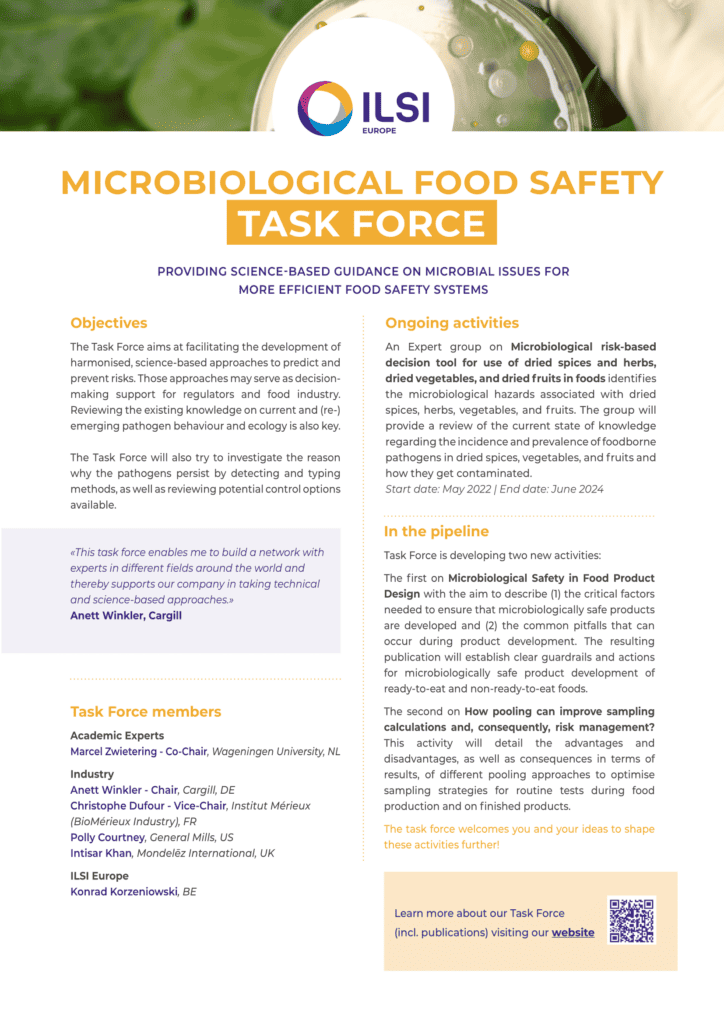Providing science-based guidance on microbial issues for more efficient food safety systems
Task Force Information
Objectives
The Task Force aims at facilitating the development of harmonised, science-based approaches to predict and prevent risks. Those approaches may serve as decision-making support for regulators and food industry. Reviewing the existing knowledge on current and (re-)emerging pathogen behaviour and ecology is also key.
The Task Force will also try to answer the reason why the pathogens persist by detecting and typing methods, as well as reviewing potential control options available.
Task Force Members
| Anett Winkler - Chair | Cargill | Food Safety Advisor | DE |
| Catherine Pelletier | Institut Mérieux (bioMérieux Industry) | Manager Expertise and Innovation | FR |
| Marcel Zwietering – Co-Chair | University of Wageningen | Professor | NL |
| Polly Courtney | General Mills | Food Safety Technical Team Manager | US |
| Intisar Khan | Mondelēz International | Global Food Safety Programs Director | UK |
| Konrad Korzeniowski | ILSI Europe | Scientific Project Manager | BE |
* Scientific Advisors
Contact Information
For more detailed information, please contact Konrad Korzeniowski at kkorzeniowski@ilsieurope.be
Activity Overview
Ongoing
- Microbiological risk-based decision tool for use of dried spices and herbs, dried vegetables, and dried fruits in foods
Expert group on Microbiological risk-based decision tool for use of dried spices and herbs, dried vegetables, and dried fruits in foods. The objective is to identify the microbiological hazards associated with dried spices, herbs, vegetables, and fruits. Provide a review of the current state of knowledge regarding the incidence and prevalence of foodborne pathogens in dried spices, vegetables, and fruits and how they get contaminated.
In the pipeline
- Microbiological Safety in Food Product Design
The aim is to describe (1) the critical factors needed to ensure that microbiologically safe products are developed and (2) the common pitfalls that can occur during product development. The resultingbpublication will establish clear guardrails and actionsb for microbiologically safe product development ofready-to-eat and non-ready-to-eat foods.
- How pooling can improve sampling calculations and, consequently, risk management?
This activity will detail the advantages and disadvantages, as well as consequences in terms of results, of different pooling approaches to optimise sampling strategies for routine tests during food production and on finished products.
Expert Groups
Microbiological risk-based decision tool for use of dried spices and herbs, dried vegetables, and dried fruits in foods
Background and Objectives
Expert group on Microbiological risk-based decision tool for use of dried spices and herbs, dried vegetables, and dried fruits in foods. The objective is to identify the microbiological hazards associated with dried spices, herbs, vegetables, and fruits. Provide a review of the current state of knowledge regarding the incidence and prevalence of foodborne pathogens in dried spices, vegetables, and fruits and how they get contaminated.
Output
This activity will result in a developing a practical risk-based decision tool for the use of dried spices, herbs, vegetables, and fruits for food safety and research & development professionals, including food industry examples.
Expert Group Members
| Heidy den Besten – Chair | Wageningen University and Research | Associate professor | NL |
| Linda Harris – Co-Chair | University of Californis - Davis | Professor | US |
| Jennifer Acuff | University of Arkansas | Assistant Professor of Food Microbiology and Safety | US |
| Polly Courtney – Vice-Chair | General Mills | Quality & Regulatory Operations | US |
| Rob Limburn | Campden BRI | Group Manager, Industrial Process Microbiology | UK |
| Frank Devlieghere | Ghent University | Professor | BE |
| Francois Bourdichon | Catholic University of the Sacred Heart | Researcher | IT |
| Cathetrine Pelletier | Institut Mérieux (BioMérieux Industry) | Manager Expertise and Innovation | FR |
| Intisar Khan | Mondelēz International | Global Food Safety Programs Director | UK |
| Andreja Rajkovic | University of Ghent | Professor in Microbial Food Safety | BE |
| Anett Winkler | Cargill | Food Safety Advisor | DE |
| Konrad Korzeniowski | ILSI Europe | Scientific Project Manager | BE |
Publications
Event Proceedings
No results.

